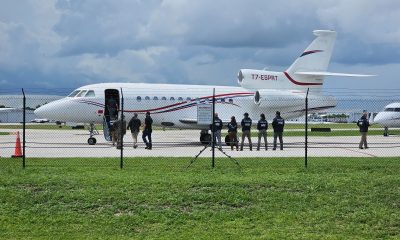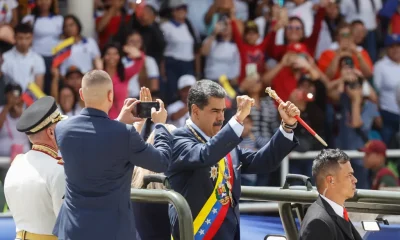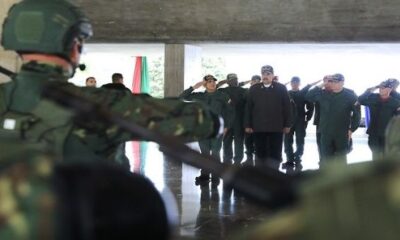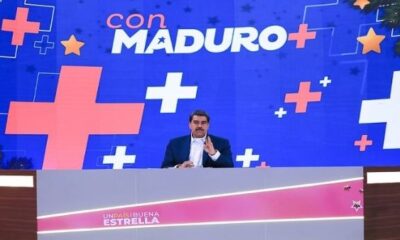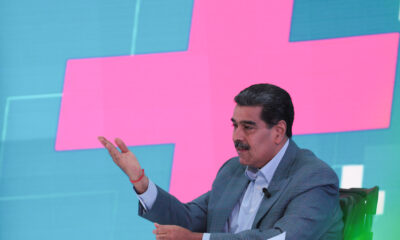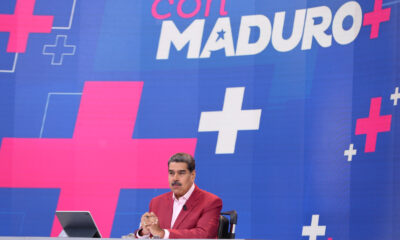International
Venezuelan President receives diplomat Alex Saab after his release from prison
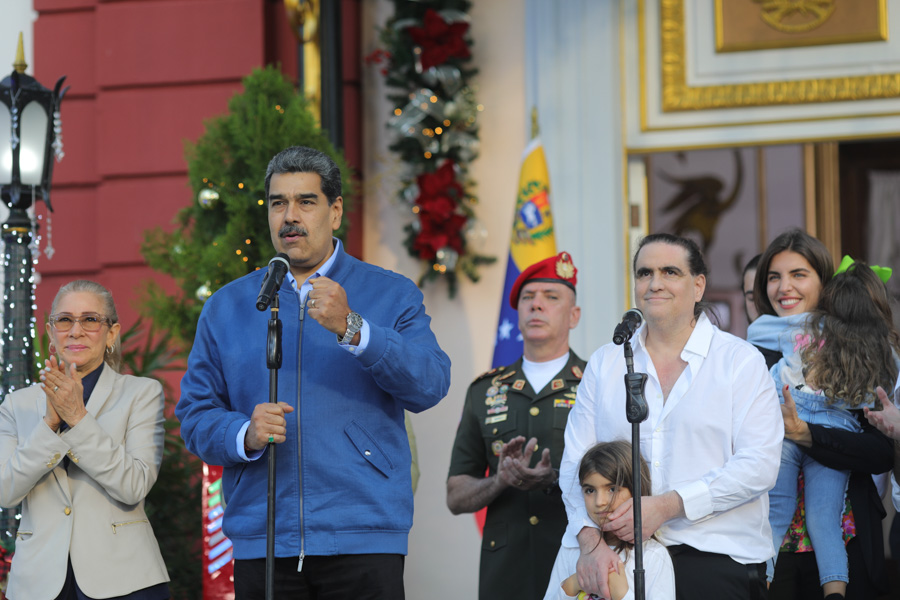
December 21 |
Venezuelan President Nicolas Maduro received on Wednesday diplomat Alex Saab, who was released after more than 1,280 days kidnapped in the United States (US).
The meeting is held at the Miraflores Palace, seat of the Government, in Caracas (capital), after the diplomat arrived in the country at the International Airport of Maiquetía Simón Bolívar, in the state of La Guaira, being received by the first combatant and deputy of the National Assembly, Cilia Flores, along with the diplomat’s wife, Camila Fabri, and other family members.
After receiving the diplomat, the President declared that “the only truth is that Alex Saab’s only crime was to overcome criminal sanctions, to look for medicines in times of pandemic”.
“I want to welcome this brave man, patriot, who resisted 1,280 days, 40 months, the most adverse conditions, the most painful, of kidnapping, filthy jails, physical torture, psychological torture, threats, lies; and after 1,280 days of kidnapping, the truth has triumphed, justice has triumphed”, he highlighted.
The Head of State said that he knew that “this day had to come, and this day has arrived”; he also thanked the efforts made by the President of the National Assembly (AN), Jorge Rodríguez, as well as the Governor of Miranda State, Héctor Rodríguez, “who have led this whole process that has allowed this exchange today with the Government of the United States of America, and the safe, alive and free rescue of Alex Saab Morán”.
“All the medicines that you were looking for Alex, arrived to the people; all the vaccines, arrived to the people. While you were kidnapped and tortured in Cape Verde, infamous Cape Verde, all those vaccines and medicines arrived. When that tremendous crisis due to the blockade, all the gasoline that you got in the world, arrived; all the food for the CLAP, arrived while you were kidnapped, Alex. All this arrived for a dignified people”, the President emphasized.
President Maduro also thanked “the negotiation part, Dr. Gerardo Blyde, and all the negotiation commission of the Barbados table, because they have also been part of the Barbados agreements and of this exchange that has taken place today”.
“I would like to thank in a very special way the Emir of Qatar, the State of Qatar, the Government of Qatar, because it has been a brilliant facilitator, of exquisite diplomacy for the rapprochement, for the dialogues, for the signing of the agreements, and for the partial fulfillment of the signed agreements (…) I am very grateful to all those who have contributed for this agreement to be fulfilled, for this positive step to be taken, for this exchange to take place”, he declared.
The President indicated to his US counterpart, Joe Biden, as well as to the politicians of that country, that “here is Venezuela standing up, with its own model, independent, sovereign, we will be nobody’s colony”. Likewise, he explained that they had previously talked with former President Donald Trump for the release of Saab, “we almost had it ready, what happened is that he lost the elections and there was a change of government, then we had to start all over again, but with Donald Trump we already had an agreement ready”.
On his part, diplomat Saab stated that “life is a constant miracle and today the miracle of freedom, the miracle of justice, has come true”, and thanked those who supported him during his kidnapping.
Thanks to the people of Venezuela. I am proud to serve the people of Venezuela and to serve this Government, a humane Government, a loyal Government, a Government that does not abandon and a Government that, like me, never gives up.
Previously, the Venezuelan Government informed in a communiqué, published by the Vice President of Communication, Culture and Tourism, Freddy Ñáñez, in which it is emphasized that “the people receive him with pride after having suffered three and a half years of illegal detention under cruel, inhuman and degrading treatment, violating his human rights and the Vienna Convention that confers diplomatic immunity”.
At the time, the Venezuelan Foreign Ministry denounced the arbitrary detention of diplomat Saab in Cape Verde, on June 12, 2020, and his illegal transfer to the U.S., on October 16, 2021.
“At the time of his illegal capture, Saab was traveling to Iran as a diplomatic agent of the Venezuelan State, in order to facilitate the acquisition of food in view of the impact of the Unilateral Coercive Measures (MCU) against the Local Supply and Production Committees (Clap), a mechanism of articulation with the communities that distributes food to more than 7 million families,” the Foreign Ministry explained.
International
DHS Secretary Kristi Noem’s Purse Stolen in D.C. Restaurant Heist

The purse of Kristi Noem, Secretary of the Department of Homeland Security, was stolen on Sunday night at a restaurant in Washington, D.C., Fox News Digital confirmed through several agency sources.
The handbag, taken by a white male wearing a mask, reportedly contained $3,000 in cash along with personal documents, including her passport, keys, driver’s license, and DHS badge, according to an agency spokesperson.
“Her entire family was in town, including her children and grandchildren. She was celebrating her retirement by treating them to dinner, activities, and Easter gifts,” the spokesperson added.
Crime continues to be a significant issue in the U.S. capital, particularly theft. However, violent crime reached its lowest level in 30 years last year, according to the Office of the Attorney General at the time.
International
Pope Francis: The Quiet Architect Behind the U.S.-Cuba Thaw
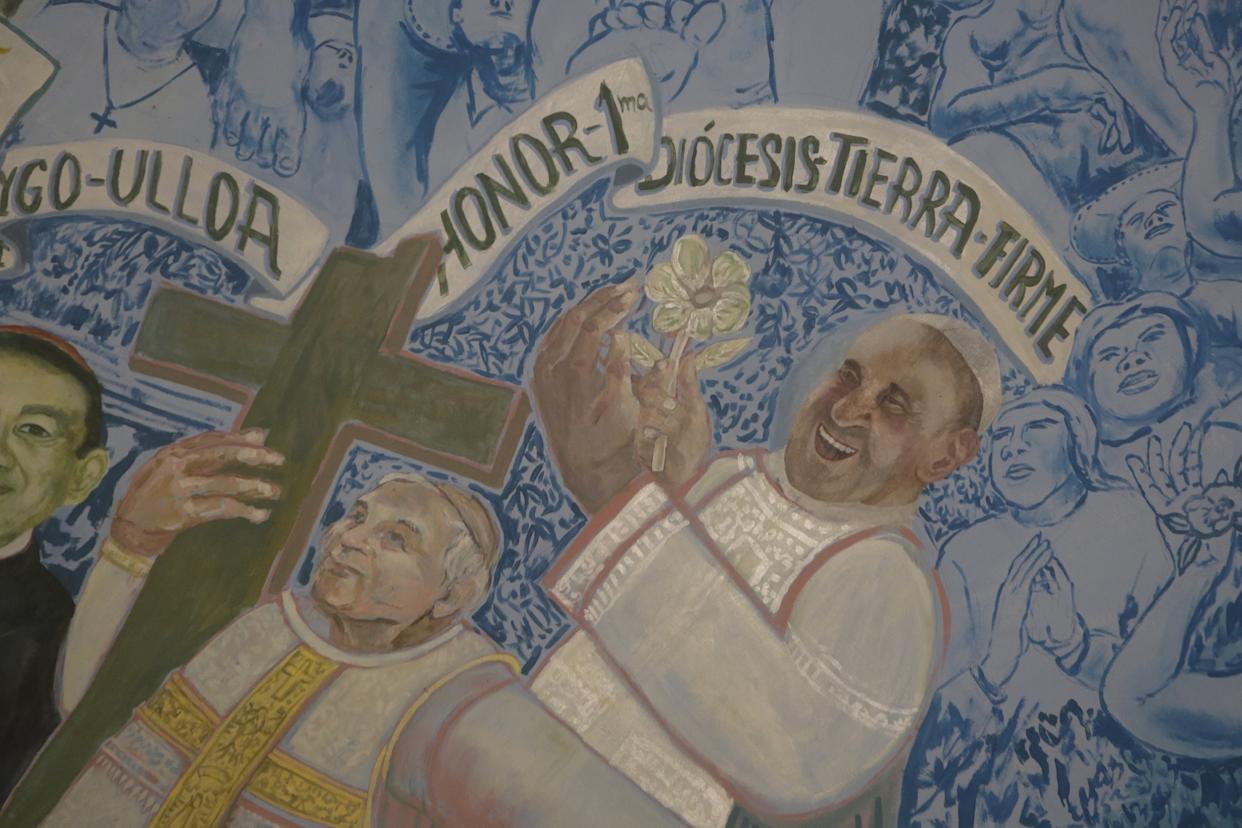
When then-U.S. President Barack Obama and Cuban President Raúl Castro announced the reestablishment of diplomatic relations in December 2014—after decades of hostility—there was a third figure present in both speeches: Pope Francis.
This thaw in U.S.-Cuba relations—later reversed by Donald Trump—was the result of behind-the-scenes negotiations personally encouraged by Pope Francis, who passed away on Monday at the age of 88, just over a year after becoming head of the Catholic Church.
Upon learning the news of the breakthrough, the pontiff humbly stated, “This was made possible thanks to the ambassadors and to diplomacy,” which he called “a noble, very noble job.”
In 2015, months after the announcement, Raúl Castro visited the Vatican and met with the pope. Over time, Castro developed a fondness for Francis that he never had for his predecessors, Benedict XVI and John Paul II. “If the Pope continues talking like this, sooner or later I’ll start praying again and return to the Catholic Church—and I’m not joking,” said the younger Castro, who, like his brother Fidel (1926–2016), had been educated by Jesuits—the same order to which Pope Francis belonged.
Pope Francis visited Cuba later that year. Just days before his arrival, the Cuban government announced the pardon of 3,522 common prisoners as an act of clemency.
While in Havana, the pope met with Fidel Castro, who gave him a first edition of the book Fidel and Religion by Brazilian friar and liberation theologian Frei Betto.
Criticism from the Opposition
Francis’s diplomatic approach also drew criticism from parts of the Cuban opposition. In a 2022 interview with Univision, the pope revealed he had “a human relationship” with Raúl Castro.
International
Dominican Republic Declares Three Days of Mourning for Pope Francis

Dominican Republic President Luis Abinader has declared three days of national mourning starting Tuesday following the death of Pope Francis, who passed away on Monday at the age of 88 in his residence at the Casa Santa Marta.
In an official decree, Abinader highlighted the pope’s legacy “as a global leader who promoted significant reforms within the Catholic Church and was known for his humility, openness to dialogue, and commitment to peace among nations.”
During the mourning period, the national flag will be flown at half-staff at military facilities and public buildings.
According to a statement from the Office of the Presidency, although Pope Francis never visited the Dominican Republic during his papacy, he maintained a close relationship with the country. He expressed solidarity and empathy during difficult times, including offering prayers for the victims of the recent tragedy at a Santo Domingo nightclub on April 8, which claimed 232 lives and left more than 180 injured.
-

 Central America4 days ago
Central America4 days agoNicaraguan Exiles to Mark 7th Anniversary of 2018 Protests with Global Commemorations
-

 International4 days ago
International4 days agoDominican ‘False Hero’ Arrested for Faking Role in Nightclub Collapse That Killed 231
-

 International3 days ago
International3 days agoACLU seeks emergency court order to stop venezuelan deportations under Wartime Law
-

 Central America3 days ago
Central America3 days agoUN complaint filed against Costa Rica over detention of migrant children
-

 International2 days ago
International2 days agoThousands rally nationwide against Trump’s threat to U.S. democracy
-

 Central America1 day ago
Central America1 day agoSenator Van Hollen Meets with Deported MS-13 Member in El Salvador; Trump and Bukele React
-

 International1 day ago
International1 day agoPope Francis Appears for Easter Blessing, Calls for Peace and Religious Freedom
-

 Central America8 hours ago
Central America8 hours agoCardinal Rodríguez to Attend Funeral of Pope Francis: “He Was Very Dear to Me”
-

 Central America8 hours ago
Central America8 hours agoNicaragua’s Ortega and Murillo Mourn Pope Francis, Acknowledge ‘Difficult’ Relationship
-

 International8 hours ago
International8 hours agoDominican Republic Declares Three Days of Mourning for Pope Francis
-

 International7 hours ago
International7 hours agoDHS Secretary Kristi Noem’s Purse Stolen in D.C. Restaurant Heist
-

 International7 hours ago
International7 hours agoPope Francis: The Quiet Architect Behind the U.S.-Cuba Thaw














